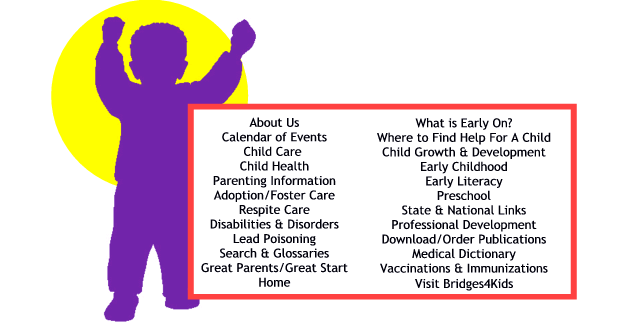|
Michigan
Genetics Resource Center -
Some birth defects can be prevented. For
example, spina bifida is a neural tube defect caused by incomplete
development of the spinal cord. Neural tube defects can be prevented by
taking enough folic acid before and during the first month of pregnancy. For
more information about ways to prevent certain birth defects
click here (PDF) to view the Preventing Birth
Defects Brochure. If you would like to order a copy of
this pamphlet click here.
Birth Defects Quick Reference and Fact Sheet - About 150,000 babies are
born each year with birth defects. The parents of one out of every 28 babies
receive the frightening news that their baby has a birth defect. A birth
defect is an abnormality of structure, function or metabolism (body
chemistry) present at birth that results in physical or mental disability,
or is fatal. Several thousand different birth defects have been identified.
Birth defects are the leading cause of death in the first year of life.
Having A Healthy Pregnancy: ABC's...Pregnancy Tips (A-Z) - Not all birth
defects can be prevented, but a woman can take some actions that increase
her chance of having a healthy baby. Many birth defects happen very early
in pregnancy, sometimes before a woman even knows she is pregnant. Remember
that about half of all pregnancies are unplanned.
March of Dimes Resource Center
Phone: 1-888-663-4637
Email:
askus@marchofdimes.com
Web:
www.modimes.org or
www.marchofdimes.com
Centers for Disease Control &
Prevention (CDC)
Phone: 1-888-232-6789
Web:
http://www.cdc.gov/ncbddd/bd/default.htm
Michigan Teratogen Information Service
Phone: 1-877-53-MITIS
Call if you have questions about
medications or other exposures during pregnancy.
Michigan's Genetics Resource Center
Responding to the needs of Michigan
residents, Michigan Genetic Connection is a central source of information on
genetic health care and related topics. Visit our website or call toll
free to find the information and services that you're looking for.
Phone: 1-866-852-1247
Web:
www.MiGeneticsConnection.org
Cleft Palate
Foundation
A Voluntary health organization dedicated to enhancing the quality of
life for individuals affected by facial birth defects and their families
through education, research support, and facilitation of family-centered
care.
Phone:
800-24-CLEFT
Web: www.cleftline.org
Email: cleftline@aol.com
Fragile X
Research Foundation
Learn more about Fragile X syndrome and the Fragile X Research Foundation
which supports research to find a treatment and a cure for Fragile X.
National
Birth Defects Prevention Network
The mission of the National Birth
Defects Prevention Network is to establish and maintain a national network
of state and population-based programs for birth defects surveillance and
research to assess the impact of birth defects upon children, families, and
health care; to identify factors that can be used to develop primary
prevention strategies; and to assist families and their providers in
secondary disabilities prevention.
U.S.
Food and Drug Administration (FDA) Center for Drug Evaluation and Research
The Center for Drug Evaluation and Research at the FDA has many
responsibilities including monitoring the safety and effectiveness of
prescription and over-the-counter drugs that are available in the United
States.
March of
Dimes Birth Defects Foundation
The March of Dimes works to improve the health of babies by preventing
birth defects and infant mortality through programs, research, community
services, education and advocacy.
National
Healthy Mothers, Healthy Babies Coalition
The National Healthy Mothers, Healthy Babies Coalition (HMHB) works to
raise public awareness of the basic components of prenatal care--early care,
good nutrition, avoidance of drugs including alcohol and tobacco, and
promotion of breastfeeding.
Organization of Teratology
Information Services (OTIS)
The services that belong to OTIS provide information about exposures during
pregnancy and risk assessment to health care professionals and to the
public. There are services located in most states, and a national referral
number to answer questions from geographic regions that are not currently
covered by a service.
Spina
Bifida Association of America
The mission of the Spina Bifida Association of America is to promote the
prevention of spina bifida and to enhance the lives of all affected
individuals.
Teratology Society
The Teratology Society is a scientific organization whose members study
the causes and biological processes leading to abnormal development and
birth defects.
Teratology Society
- Just for Students
The Teratology Society has developed this section for high school and
college students to learn more about teratology.
|
